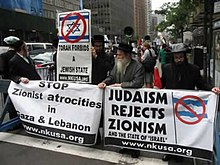Moshe Ber Beck, or Moshe Dov Beck (Yiddish: משה בער בעק; May 17, 1934 – April 15, 2021),[2] was a Hungarian-born American rabbi and anti-Zionist campaigner. He was the leader of one of the Neturei Karta branches in the United States.
Rabbi Moshe Ber Beck | |
|---|---|
 Moshe Ber Beck (center, in gray caftan) | |
| Personal | |
| Born | 17 May 1934[1] |
| Died | 15 April 2021 (aged 86) Monsey, New York, U.S. |
| Religion | Judaism |
| Position | Chief rabbi |
| Organisation | Neturei Karta USA |
| Residence | Monsey, New York, U.S. |
Biography
Moshe Ber Beck was born in Nyírbogát, Hungary. His early childhood was spent hiding with his brother from Nazi persecution until 1945, when Soviet troops took Budapest. In 1948, he migrated to Bnei Brak, Israel, where he began yeshiva studies. In 1959, he married, and at that time joined Neturei Karta, leaving the Vizhnitz Hasidic movement of which he had formerly been a part.[3] He left Israel in 1970 because, he said, of his strong opposition to Zionism, and subsequently lived in Monsey, New York, where he worked as a rabbi and anti-Zionist activist.[1]
Beck died from complications related to COVID-19 on 15 April 2021. He was 86 years old.[2][4]
Anti-Zionist campaigning


Moshe Ber Beck, along with other rabbis such as Yisroel Dovid Weiss, was known as a Haredi opponent of Zionism, but, like all of Neturei Karta, to an extent which put him far beyond the mainstream Haredi viewpoint. He was one of the leaders of Neturei Karta in the U.S. Among other activities, he participated in a visit to Iran in 2006 during which he met with President Mahmoud Ahmadinejad to publicize Haredi opposition to Zionism. Beck denounced what he considered a political use of the Holocaust by what he called the Zionist establishment. In 2014, he appeared in a lengthy interview on the documentary Judaism in the Era of Zionism in which he laid out his anti-Zionist viewpoint.
Beck's opposition to Zionism was based, he claimed, upon the works of Satmar founder Joel Teitelbaum (especially Vayoel Moshe, a lengthy work which aims to demonstrate that Jews are commanded by the Torah to remain in exile until redeemed by the messiah and are therefore prohibited to establish an independent country). However, Satmar distanced itself from Beck, and the Satmar Court condemned Neturei Karta's "fanaticism."[5]